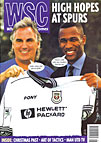 Football is changing due to a new breed of chairmen. David Conn, author of The Football Business, outlines how the game is being affected by those who own the clubs
Football is changing due to a new breed of chairmen. David Conn, author of The Football Business, outlines how the game is being affected by those who own the clubs
Beneath the high-pitched hype, English football presents some stark realities. Sir John Hall, former tireless warrior of the ‘Geordie nation’, made £100m for himself and his family out of Newcastle United when it floated on the Stock Market in April. He is now living mostly in Spain. Martin Edwards, chief executive of Manchester United plc, bought into United for £600,000 in 1978. He has recently made £33m cash from selling some of his shares, and retains a 15 per cent stake in United, worth around £60m.
Supporters are described in the City as ‘a captive market’, and exploited by rising ticket prices, contrary to the recommendations of the Taylor Report. Many fans can no longer afford to watch their teams. Football League clubs struggle against increasingly difficult odds, in direct competition with Premiership and European matches on television nearly every night. Semi-professional clubs are going bust. School and youth teams are dependent on overworked volunteers. Sunday football is declining. And it is a sign of the depressing times that the commonest response to these facts is this: “So What?” The lack of opposition, protest and media debate is more than apathy, worse than ignorance. Jargonized excuses for greed such as ‘supply and demand’ and ‘brand loyalty’ hold Britain in thrall.
Of course football was never owned by the people; it was the property of a motley collection of self-made businessmen, often pursuing their own interests at the expense of the sport. Hillsborough was the catastrophe waiting to happen at the grounds they neglected. But this does not justify what has happened since. Hillsborough, as Lord Justice Taylor himself argued in his report, should have brought wholesale reform, “the fullest reassessment of policy for the game”. Instead, football was taken over by those looking to get rich out of it. Make no mistake: the personal fortunes made recently by opportunist chairmen are the first ever made in football.
However incompetent or mean-spirited many old style chairmen were, they could not make big profits out of owning football club shares. Some may have been on the fiddle but the Football Association imposed rules early in the century to preserve football clubs as purely clubs, and not as exploitable companies. The rules are still in the FA handbook, as Rule 34. They restrict the payment of dividends and the earnings that can be made by directors and, importantly, provide that a football club cannot be wound up and its ground sold off.
Introduced around 1912, these rules protected clubs against speculation: a businessman could not get cash out via dividends or salary, nor could he profit from winding up the club. Directors described themselves as ‘custodians of the club for the town’. However hypocritical this was in many cases, at least there was some protection. In the lower levels of the game people still talk of football like this, as a thing to be preserved. But the FA Carling Premiership has tossed aside any sense of football’s value, beyond what coin it can turn.
In the Football League, television money was always redistributed throughout the four divisions. As the money got bigger, the Big Five grew less inclined to share, and muttered about breaking away. To its shame, the FA betrayed its responsibilities as guardians of the game, and puts its name to the tawdry venture to win a dismal turf war with the Football League. They knew the 1992 TV deal would be massive, and it was: £305m in 1992 over five years, now £670m over the next four. This, plus taxpayers’ money via Football Trust grants, to only 22 (now 20) clubs, made Premiership football very attractive to businessmen. As one accountant told me: “Clubs are no longer rich men’s hobbies, but ‘investment vehicles’.” When a football club floats now, it specifically tells the City it is bypassing Rule 34. Holding companies are formed, to which the grounds are transferred. The football clubs become mere subsidiaries, officially paying rent to the floated plc.
Directors can pay themselves a fortune, even for part-time status, and for the first time ever football clubs can now be wound up and the grounds flogged off. The time of the greatest ever wealth in football, after a century of struggle, is the time when the game’s money is least fairly distributed. The argument about this goes beyond mere mechanics, the surface arguments about whether the England team is better, whether there are too many foreign players or too many kit changes. In the age of market forces the FA has forgotten that money should be made to serve the game not the other way around. The governing body has failed to govern and is now a major part of the problem.
Football is supported by the government, in the World Cup bid and the £200 million handed to the top clubs by the Football Trust, now being funded by the National Lottery. If the FA will not regulate as it used to, the government must impose regulation. A good case can be made for a windfall tax on the latest Sky deal, the proceeds to be spent on repairing football’s threadbare fabric. Ticket prices should be kept affordable, as Lord Taylor urged. Football’s hopelessly fractured administration should be unified into a single federation. If this doesn’t happen, if the vaunted Task Force proves to be just a platform for the dismal David Mellor, football will be lost.
From WSC 131 January 1998. What was happening this month